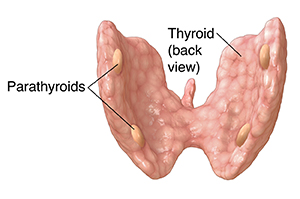Having Parathyroid Surgery
You have 1 or more enlarged parathyroid glands. This can cause primary hyperparathyroidism. The parathyroid glands control the calcium level in your blood. Primary hyperparathyroidism causes high levels of blood calcium (hypercalcemia). This can lead to problems all over your body. To treat the problem, the enlarged glands are often removed with surgery. You may need 1 or more parathyroid glands removed. The decision about how many glands to remove is often made during surgery. Ask your healthcare provider for more information.

Risks and possible complications
The risks and possible complications of this procedure include:
-
Bleeding
-
Infection
-
Reaction to anesthesia
-
Thyroid gland problems
-
Injury to laryngeal nerves that affect the vocal cords
-
Failure to find the enlarged gland or glands
-
Need for more surgery
-
Low calcium and parathyroid levels (hypoparathyroidism)
Getting ready for surgery
After your surgery is scheduled, you’ll be told how to get ready. Follow all instructions and ask questions as needed. Have all of your presurgery questions answered before you sign the informed consent form. Signing this form means that you agree to the procedure. Make sure to:
-
Tell your healthcare provider about any medicines you’re taking. This includes over-the-counter and prescription medicines. It also includes vitamins, herbs, and other supplements. You may need to stop taking some medicines 1 to 2 weeks before surgery. These include aspirin and anti-inflammatory medicines, such as ibuprofen and naproxen.
-
Follow all directions you're given for not eating or drinking before surgery.
-
Arrange for an adult family member or friend to give you a ride home after surgery.
The day of surgery
Arrive for surgery on time. Before going to surgery:
-
You’ll need to register. This may be done ahead of time during an earlier visit, online, or over the phone. Have photo identification and insurance information ready.
-
An IV (intravenous) line will be placed in a vein in your arm or hand. This is used to give fluids and medicines.
-
A healthcare provider or nurse will talk with you about what type of pain medicine (anesthesia) you'll have during surgery.
During the surgery
-
A cut (incision) is made in your neck.
-
One or more enlarged parathyroid glands are removed. In some cases, all 4 glands are enlarged. When this happens, 3 1/2 of the glands may be taken out. The remaining 1/2 gland often makes enough hormone to replace 4 normal glands. In rare cases, all of the glands are taken out.
-
If all 4 glands are taken out, part of 1 gland is then placed in another part in the body (parathyroid autotransplantation). It's often placed in the neck or arm. The moved gland keeps working from this new place in the body.
-
When surgery is done, the incision is closed with stitches, strips of surgical tape, or surgical glue.
After the surgery
Recovery is often quick. You may go home on the day of surgery. Or you may need to stay overnight. Once you’re ready to go home, you’ll be given instructions for how to care for yourself. Follow these carefully. You may need to take vitamin D and calcium supplements after the surgery. You may need to have your parathyroid hormone and calcium blood level tested after surgery. That's because it sometimes drops right after surgery.
When to call your healthcare provider
Call your healthcare provider if you have any of these during your recovery:
-
Numbness or tingling in the fingertips or around the mouth
-
Muscle cramping or spasms
-
Neck swelling
-
Fever of 100.4°F ( 38.0°C) or higher, or as advised by your provider
-
More redness, swelling, or fluid leaking from the incision site
-
Upset stomach (nausea) or vomiting
-
Hoarse voice that gets worse
-
Trouble breathing
-
Trouble swallowing
-
Irregular heartbeat
Online Medical Reviewer:
Chris Southard RN
Online Medical Reviewer:
Marianne Fraser MSN RN
Online Medical Reviewer:
Melinda Murray Ratini DO
Date Last Reviewed:
3/1/2024
© 2000-2026 The StayWell Company, LLC. All rights reserved. This information is not intended as a substitute for professional medical care. Always follow your healthcare professional's instructions.